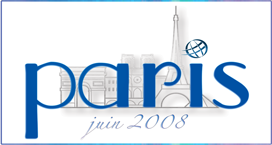Visa Information
Who needs a visa? And which one?

Receive up to 10% DISCOUNTED RATES when you BOOK YOUR TRAVEL WITH AIR FRANCE!
U.S. and Canadian citizens planning to travel to France for short visits of 90 days or less DO NOT need visas to enter France. A valid passport is sufficient. Exceptions exist for:
* Journalists traveling to France on assignment
* Crew Members on short-term assignment (film crews, etc.)
* Individuals holding diplomatic or official passports
If you belong to one of the above categories, you need to submit a short-stay visa application to the embassy or consulate closest to you. U.S. citizens can consult the French Embassy in the United States for more details. Canadian citizens can locate their nearest French consulate here
Citizen of one of EU/EEA countries (i.e. all 25 European Union member countries, Iceland, Lichtenstein and Norway) do not need a visa for France.
Non-EU/EEA citizens need a visa to enter France, unless there exists a special agreement between France and your home country. These include: Andorra, Argentina, Australia, Bolivia, Brazil, Brunei, Bulgaria, Canada, Chile, Costa Rica, Croatia, El Salvador, Ecuador, Guatemala, Honduras, Israel, Japan, Malaysia, Mexico, Monaco, New Zealand, Nicaragua, Panama, Paraguay, Romania, San Marino, Singapore, South Korea, Switzerland, United States, Uruguay, Vatican and Venezuela. Citizens of these countries can stay for up to 3 months without a visa.
Visas are also waived for:
Holders of a residence document issued by a country which adheres to the Schengen Agreement; holders of passports from the Hong Kong Special Administrative Region of the People’s Republic of China and the Special Administrative Region of Macao of the People’s Republic of China; holders of a valid residence document in France; holders of a travel document issued by a country which adheres to the Schengen Agreement.
Visas are valid for the length of time stated on them, starting on the date of arrival in France. There are very big differences between visas, so make sure you know what you want (purpose and length of stay) before applying for one. It might be very difficult, or even impossible to change a visa once you are in France. For example, you cannot enter France with a short-stay visa and then apply to stay longer. Neither can you change the status of your visa (i.e. change your status from student to employee) without first returning to your country of residence and obtaining the new appropriate visa. Also, it is not possible to ask a friend at home to obtain a visa for you once you're in France. In any case, you have to get out of the Schengen Area in order to apply for a new type of visa, so plan accordingly.
SCHENGEN STATES:
Austria, Belgium, Denmark, Finland, France, Germany, Greece, Iceland, Italy, Luxembourg, Netherlands, Norway, Portugal, Spain, Sweden.
and since 21 December 2007 : Czeck Republic, Estonia, Hungary, Latvia, Lithuania, Malta, Poland, Slovakia and Slovenia.
The main kinds of visa are:
1. Short-stay visa (visa de court séjour)
Valid for a maximum of 3 months. A visa granted by one of Schengen Area countries (for example, Germany) is valid in all other member countries and authorises its holder to circulate freely within Schengen area. This means that traveling within the Schengen Area is legally the same as traveling within France and thus you can make as many entries to France as you wish during the validity of your visa, as long as you do not leave the Schengen Area. If you intend to leave and re-entry the Schengen Area (for example visiting the U.K., which is not a signatory state to the treaty), you have to ask for a multiple-entry short term visa!
2. Long-stay visa (visa de long séjour)
A long-stay visa is valid for 3-6 months. After arriving in France you need to apply for a temporary stay permit (Carte de séjour temporaire) which will describe your status in France: visitor ( visiteur), student (étudiant), private or family purposes (vie privée et familiale), employee (salarié), etc.
3. Temporary long-stay visa (Visa long séjour temporaire de six mois)
This visa is valid for stays up to 6 months, but you do not need to apply for temporary stay permit ( Carte de séjour temporaire). You cannot remain in France past the visa validity date.
4. Short-stay 'student-examination' visa (Etudiant-concours)
This visa is for students whose enrollment into a academic institution is conditional on an examination in France. If the enrollment is approved after a successful entry exam, you then have to apply for temporary stay permit ( Carte de séjour temporaire).
5. Circulation visa (Visa de circulation)
This visa is valid from one to five years and allows stays in France up to 3 months every six months.
6. Transit visa (visa de transit aéroportuaire)
Nationals of some countries transiting France from one country to another must present this kind of visa. Be aware, processing times can be long, so apply well in advance.
Visas are never issued in France, so they must be applied for in your home or another country. If you are required to have a visa, do not attempt to enter France as you are likely to be refused entry. Generally, you should apply for your visa 8-12 weeks before your planned date of arrival in France - check with the issuing authorities (such as your local French Embassy or Consulate) for likely delays.
Long-stay and other specific visas are normally issued in your country of residence. A short-stay visa can be issued by any Schengen country (in principle, you should get the visa from the authorities of the main destination country).
FRENCH EMBASSIES AND CONSULATES ABROAD
Up-to-date information about visa requirements is available on the official website of the French Ministry of Interior (in French, English and Spanish). The site is well organised. Based on the country of residency, your nationality and length and purpose of stay it gives all important information, such as:
• Visas requirements, types and issuing conditions (such as valid passport, health insurance, proof of sufficient sources, proof of preliminary entry to the education institution in case of students, etc.)
• documentation required for an application and where to apply, which is usually the Consular section of the French Embassy in the country of residence
• cost of the visa
A uniform visa application form is used by all members of the Schengen countries. The application form is available in five languages. You will need to have Adobe Acrobat Reader installed to be able to view and print this form.
To download a free Adobe Acrobat Reader, click here
To download the form, click on your language of choice,
- English
- French
- Spanish
- German
- Dutch




















